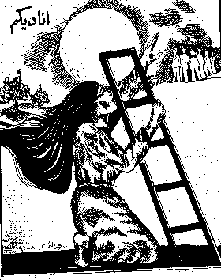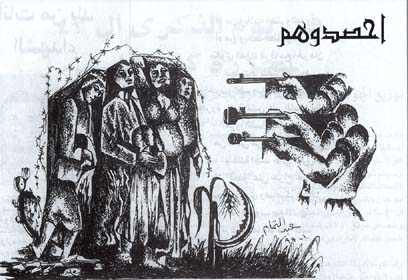Staying alive
Once there was a thriving Arab women's movement. Right
now, survival is our political act
Ahdaf Soueif
Thursday March 13, 2003
The Guardian
In Baghdad on any given day you might come across her. I
will not tell you her name - but she is tall and slim
with brushed silver hair. She dresses in black with black
trainers and thick black socks. Her husband, now dead,
was an Iraqi ambassador long ago. Now she sets out from
her home every morning and walks. She walks though the
streets looking and listening and asking questions. Her
project is to memorise what is happening to the people
and
the daily life of her country. She's 88 and doesn't have
much time.
None of us have much time.
Have you ever seen a patched book? Here it is: SJ's slim
volume The Poet. SJ has a PhD in Arabic literature from
Baghdad university. The ancient piece of machinery coaxed
into printing her book either dries up or floods. On
pages where the damage is too bad SJ writes out the
missing words by hand on a piece of paper and glues it in
place. "War gives birth," she writes, "and
mothers do the bringing up." She sells The Poet at
125 dinars a copy, hoping eventually to pay back the
3,000 dinars it's cost to produce. Three thousand dinars
equals $1.50.
Do you see these women represented in the western  media? Arab women are
generally portrayed as victimised, subservient. They sit
next to silent, wide-eyed children in Iraqi hospitals,
they stumble among the ruins of their homes in Jenin.
Many in the west seem to think they need to be dragged
out from under their veils and scolded into standing up
for themselves. But as we all try to block, to temper, to
survive the coming horror, it is crucial for sympathisers
in the west to understand the truth. The women's movement
started in Egypt, Palestine and Syria in the 1880s. By
the 1960s women in media? Arab women are
generally portrayed as victimised, subservient. They sit
next to silent, wide-eyed children in Iraqi hospitals,
they stumble among the ruins of their homes in Jenin.
Many in the west seem to think they need to be dragged
out from under their veils and scolded into standing up
for themselves. But as we all try to block, to temper, to
survive the coming horror, it is crucial for sympathisers
in the west to understand the truth. The women's movement
started in Egypt, Palestine and Syria in the 1880s. By
the 1960s women in
many Arab countries had the vote, equal pay for equal
work and maternity and childcare legislation that is
still a dream in the west. Massive women's organisations
worked to improve women's education and healthcare. Women
(and men) campaigned for reforms in the personal laws and
notched up several successes. But now all this is on
hold.
I'm asked what Arab women are doing in these critical
times. They are doing what they have to do: toughing it
out, spreading themselves thin, doing their work, making
ends meet, trying to protect their children and support
their men, turning to their friends, their sisters and
their mothers for solidarity and laughs. There was a
quieter, more equable time when women's political action
was born of choice, of a desire to change the world. Now,
simply trying to hold on to our world is a political
action.
F is an Egyptian architect. She has always been active in
women's organisations. She did voluntary literacy work
with poor urban women and her book on mothers and
children was published by the UNDP. Her husband is one of
the 14 anti-war activists detained recently in Cairo.
When she took her two daughters, both engineering
students, to visit him in Tora jail, they
were astounded at the hundreds of women and children
waiting to visit political detainees. Children were
waiting to visit grandfathers in their 70s. F's husband
(now released) is from the left but most long-term
detainees are Islamists. The majority are unofficially  detained. They have
never been to court and there is no document that gives
them prisoner status. They are not allowed to give power
of attorney to anyone. Without documents, wives cannot
draw their husbands' salaries, cannot travel, cannot
marry off a daughter or even bury a child. Because of the
conditions in the jail, the detainees' families have to
provide them with food, clothes, books, cigarettes. The
distance from the centre of Cairo to Tora jail is 20
miles. Because the detainees have no official status
there is no agreed system for visits. The women show up
and hope that they and their provisions will be allowed
in. If they are not they have to come back next day. F
and her colleagues now find themselves campaigning at
least for the proper application of the hated emergency
laws under which Egyptians have laboured since 1981. detained. They have
never been to court and there is no document that gives
them prisoner status. They are not allowed to give power
of attorney to anyone. Without documents, wives cannot
draw their husbands' salaries, cannot travel, cannot
marry off a daughter or even bury a child. Because of the
conditions in the jail, the detainees' families have to
provide them with food, clothes, books, cigarettes. The
distance from the centre of Cairo to Tora jail is 20
miles. Because the detainees have no official status
there is no agreed system for visits. The women show up
and hope that they and their provisions will be allowed
in. If they are not they have to come back next day. F
and her colleagues now find themselves campaigning at
least for the proper application of the hated emergency
laws under which Egyptians have laboured since 1981.
The emergency laws proscribe demonstrations or  unauthorised public
gatherings. Six of the marches that have taken place in
Cairo over the last two weeks have been women's marches
called by women's NGOs. Unlike marches involving men they
managed to reach both the American and Israeli embassies.
Men who demonstrate get shot before they come anywhere
near these, but the authorities are still wary of
brutalising women in public. It seems, though, that their
patience may be wearing thin; a recent demo saw 150 women
cornered by some 2,000 riot police. Last Saturday's
demonstration in front of the Arab League headquarters
linked Iraq and Palestine, for while the world's
attention is on Iraq, Ariel Sharon's army shoots at
ambulances and bulldozes houses down on top of pregnant
women. Since November 2000, 51 Palestinian women have had
to give birth at check points; 29 of their 51 babies
died. unauthorised public
gatherings. Six of the marches that have taken place in
Cairo over the last two weeks have been women's marches
called by women's NGOs. Unlike marches involving men they
managed to reach both the American and Israeli embassies.
Men who demonstrate get shot before they come anywhere
near these, but the authorities are still wary of
brutalising women in public. It seems, though, that their
patience may be wearing thin; a recent demo saw 150 women
cornered by some 2,000 riot police. Last Saturday's
demonstration in front of the Arab League headquarters
linked Iraq and Palestine, for while the world's
attention is on Iraq, Ariel Sharon's army shoots at
ambulances and bulldozes houses down on top of pregnant
women. Since November 2000, 51 Palestinian women have had
to give birth at check points; 29 of their 51 babies
died.
And yet Palestinian women continue to have babies. Is
that a political choice? At the centre of most women's
lives are the children. Soha, a nursing student, breaks
down and cries in her home in Aida Camp when a rocket
whizzes through her kitchen window at supper-time and out
through the facing wall into the mercifully empty
bedroom. Her mother tells her to buck up and not scare
the children. It is sobering to note that the first
Palestinian woman to make the political decision to
become a human bomb was a nurse, caring daily for
children injured or maimed by Israeli bullets. In between
these two extremes - the giving and the giving up of
life, hundreds of thousands of women go about their
business as best they can.
Karma Abu Sharif, though 60 years younger than our
Baghdadi friend, does not walk the streets of Ramallah.
She sits at home and compiles the Hearpalestine
newsletter and website, recording what she can of the
daily demolitions, expropriations, arrests and killings.
Keeping the children alive. Keeping culture alive.
Preserving history and telling the story - these seem to
be at the heart of our women's concerns right now.
The UN's Peter Hansen, writing in this paper last week of
 the terrible hunger in
Gaza, says that "the Palestinian extended family and
community network have saved the territories from ...
absolute collapse". Women are the backbone of these
families and networks and they are performing the same
function in Iraq. Families who have, share with those who
have not, through the agency of the churches and the
mosques. the terrible hunger in
Gaza, says that "the Palestinian extended family and
community network have saved the territories from ...
absolute collapse". Women are the backbone of these
families and networks and they are performing the same
function in Iraq. Families who have, share with those who
have not, through the agency of the churches and the
mosques.
Last night IK told me that her mother, in Baghdad, has
sold the Virgin's gold. An icon of the Virgin
that has been in the family for more than 300 years. A
neighbour in trouble - Christian, Jew or Muslim - would
come and whisper a prayer, perhaps make a pledge. When
the afflicted was healed, the traveller berthed, the
child conceived, the neighbour would fulfil the pledge.
Over the decades the Virgin was adorned with the most
delicate filaments of gold. To her children's appalled
protests that the gold was not  hers to sell, their
mother replied that the Virgin had no need of gold when
there were people in the city who were starving. But what
comes next? Where do you go after you've sold the
Virgin's gold? hers to sell, their
mother replied that the Virgin had no need of gold when
there were people in the city who were starving. But what
comes next? Where do you go after you've sold the
Virgin's gold?
·Ahdaf Soueif is an Egyptian
novelist. Her novel, The Map of Love, was
shortlisted for the Booker prize in 1999.
ahdaf@hotmail.com
.Artist of Kafr Qasem Abdel Tamam
icon
Liberating Iraq
Gilad Atzmon©2003
Watching an Iraqi mob searching for “coalition”
servicemen on Baghdad’s riverbank reveals the
‘surprising’ truth: the Iraqi people
don’t really like their ‘liberators’. This
must be shocking for Blair and Bush who present
themselves as the saviours of the Iraqi people. If this
is not bad
enough, the Iraqi army refuses to surrender. How dare
they? This is
completely against the “coalition” military
plans, and Donald Rumsfeld’s promises. Somehow, we
no longer see the victorious images of American tanks and
armoured vehicles racing in the Iraqi wilderness, quite
simply because they don’t race anymore: they crawl.
The “coalition” soldiers are terrified and with
good reason. They understand already that each Iraqi they
confront might be a ferocious enemy. They understand far
too late that they were rushed into a hostile country
with an ‘unfriendly’ population.
Four days into the war and it is already obvious: as
always in the past, army Generals were preparing
themselves to win the previous war rather than the one to
come. Just a few days ago they spoke about the masses of
Iraqi soldiers that would surrender themselves to their
‘liberators’. The American Generals were sure
that the Iraqi army would refuse to fight for their
‘tyrant’. Funnily enough it didn’t happen,
if anything it is quite the
reverse. The American led “coalition” is facing
some fierce fighting from ordinary Iraqi soldiers and
even armed civilians. It is not surprising at all that
the American Generals failed to anticipate such an Iraqi
resistance. Whilst Generals are very good at
‘predicting the past’, when it comes to the
future they are pretty miserable. Somehow they always
fail, just give them battalions and time.
In military organisations – very much like in other
rigid establishments – promotion is entirely
dependent on one’s successful adaptation of a strict
pattern of thought. In other words military
promotion is dependent on one’s acceptance of a
given doctrine while denying any other mode of thinking.
Accordingly, the higher you get in the military hierarchy
the less open-minded you are. To spare any ambiguity, if
we agree that an intelligent mind is distinguished by its
capability to process a wide range of information, it
makes sense that in the top of the military pyramid we
find the least intelligent people around. To be
more explicit: military leaders can be found to be pretty
stupid people by any standard. Israel serves as a
great example. From its early days, Israeli political
life has been governed by its most ‘brilliant’
ex-servicemen: Dayan, Rabin, Sharon, Barak etc. As we
know, none of these military geniuses managed to secure a
safe future for
Israel nor to lead its society towards peace. Apparently,
the Israeli case isn’t that special. The immaculate
German army failed in Stalingrad, the French failed in
Algeria, the Americans in Vietnam etc.
The ‘Strike on Iraq’ provides us with a unique
opportunity to watch Generals failing in real time:
Minute by minute we watch the collapse of the doctrine.
Streams of live TV images coupled with confused news
reports are enough to convince us that something goes
terribly wrong out there in the desert. We understand
already that the American and British Generals have
managed to fail in their prediction of how the war was
going to unfold. They failed to assess the reaction of
both the Iraqi army and the Iraqi people towards their
alleged “liberators”.
Was it that complicated to predict the risks involved
with  this American-lead
aggression? I am not so sure. Less than a month ago
around two million people marched in the centre of London
calling the British government to abandon the military
option. Obviously the protestors understood something
that the “coalition” Generals failed to
realise. How is it that two million civilians manage to
realize such an obvious military truth while our military
‘experts’ remain so blinded? I assume
that one of the explanations is due to the fact that the
new American-lead colonial wars fall into the category of
a culture clash. When it comes to multiculturalism or a
culture clash, even a ‘stoned hippy’ is far
more knowledgeable than a senior military expert.
Apparently, in modern colonial wars, the military man has
the least chance to predict his opponent’s
behaviour. It is very easy to explain: if a military
leader is defined by his strict acceptance of a given
isolated doctrine within a given culture, what are the
chances that he will be able to analyse a very remote
discourse in a completely different cultural and climate
sphere? As we can see, even two million peace protestors
in London proved that they understood better the conflict
to come than the “coalition” Generals.
Apparently, we find out that military leaders fail even
to understand their people at home. For instance,
we are entitled to assume that the ‘cruise-missile
philosophy’ was invented by American Generals in
order to address the western humanist concerns regarding
the safety of innocent civilians. As we can see, in the
last few days, even the accuracy of American hits over
Baghdad and the relatively low number of civilian
casualties didn’t stop hundred of thousand of people
in both in Britain and in America from protesting against
the war. We can conclude that the Army Generals
misunderstood once again, failing even to realise what
basic human concern is all about. If they fail so badly
at home it shouldn’t be too surprising if a British
General from Lincolnshire fails to predict the behaviour
of an Iraqi corporal in Basra. this American-lead
aggression? I am not so sure. Less than a month ago
around two million people marched in the centre of London
calling the British government to abandon the military
option. Obviously the protestors understood something
that the “coalition” Generals failed to
realise. How is it that two million civilians manage to
realize such an obvious military truth while our military
‘experts’ remain so blinded? I assume
that one of the explanations is due to the fact that the
new American-lead colonial wars fall into the category of
a culture clash. When it comes to multiculturalism or a
culture clash, even a ‘stoned hippy’ is far
more knowledgeable than a senior military expert.
Apparently, in modern colonial wars, the military man has
the least chance to predict his opponent’s
behaviour. It is very easy to explain: if a military
leader is defined by his strict acceptance of a given
isolated doctrine within a given culture, what are the
chances that he will be able to analyse a very remote
discourse in a completely different cultural and climate
sphere? As we can see, even two million peace protestors
in London proved that they understood better the conflict
to come than the “coalition” Generals.
Apparently, we find out that military leaders fail even
to understand their people at home. For instance,
we are entitled to assume that the ‘cruise-missile
philosophy’ was invented by American Generals in
order to address the western humanist concerns regarding
the safety of innocent civilians. As we can see, in the
last few days, even the accuracy of American hits over
Baghdad and the relatively low number of civilian
casualties didn’t stop hundred of thousand of people
in both in Britain and in America from protesting against
the war. We can conclude that the Army Generals
misunderstood once again, failing even to realise what
basic human concern is all about. If they fail so badly
at home it shouldn’t be too surprising if a British
General from Lincolnshire fails to predict the behaviour
of an Iraqi corporal in Basra.
The current “coalition” strategy failure in
Iraq should be brought to light and the sooner the
better. As we might remember, in the first Gulf war, the
Iraqi soldiers didn’t show a real tendency to fight
over Kuwaiti desert.
While this was both self-evident and quite reasonable
considering the fact that Kuwait wasn’t their
homeland, it was enough to convince the
“coalition” Generals that the Iraqi army will
run away in any given conditions. Obviously they got it
wrong! The Iraqi army and the Iraqi people have proved
already beyond any doubt that they are willing to fight
back. I assume that “coalition” Generals
learned about the Iraqi lack of willingness to fight from
intelligence reports issued by Saddam Hussein’s
political opponents. Whilst any reasonable person who
knows something about the conflict would be suspicious of
any picture portrayed by these kind of reports,
“Coalition” Generals were easily convinced that
the Iraqi people would be delighted to be
‘liberated’; it simply fitted with their
doctrine. “Coalition” Generals were
wrongly convinced that a high-tech personal blitz against
Saddam would save them from political battle with peace
activists at home. They were wrong! Peace campaigners and
anti-war coalitions have never been more popular. Again,
it is likely that American Generals managed to miss what
humanitarian concern is all about. It is not that
surprising considering the form of intellectual isolation
particular to the military. American Generals were fully
convinced that mass media coverage of their victorious
parade towards Baghdad would gain them public and
political support. They were wrong! If anything, the
media coverage exposed their own incorrect strategic
conception before they managed to realise it themselves.
Finally, at the moment, the American army leaders are
obsessed with technological superiority. The American
like their Israeli allies are fully convinced that
technological superiority can guarantee victory on the
battlefield. Consequently, American Generals are highly
trained in computer-simulated war games. They know
exactly how long it will take them to bring logistic
support from Basra to Baghdad. They know exactly how to
launch 500 missiles simultaneously at, say, the third
toilet window in Saddam’s secondary palace. But
there is one thing that the computer can’t tell
them, and that
is the will of the Iraqi man to resist. Man’s will
is yet to be formulated in ‘machine
language’. Why are the American Generals so
blind to the will of other people? Why were they lead to
such false predictions? The answer is simple: because
Generals are military men, and they are thus
distinguished by their narrow and limited intellectual
capability. They are professional in being stupid.
As we already know Saddam Hussein has yet to be abandoned
by his people. Quite the opposite, the Iraqi army is
fighting back. Moreover, following the growing number of
“coalition” casualties and military failures,
Saddam has become even more popular among the Iraqi
people, the Arab world, and beyond. Since it is clear
that British and American military men failed to realize
what Saddam symbolises for his people and the Arab people
in general, I will try to summarise the most relevant
information regarding Saddam Hussein: who he is and what
he stands for.
1. Saddam Hussein is the only state leader to publicly
support the alestinian people. This is enough to make him
into an eternal hero in the eyes of the Arab people and
everyone who believes in justice.
2. Saddam Hussein is the only state leader to stand up
against the mighty American and Zionist colonial
hegemony. This is more than enough to make him the
ultimate hero for those who believe in the idea of
‘free man’, ‘anti-colonialism’ and
‘anti-globalisation’.
I am sure that even the most remarkable of the
“coalition” Generals is capable of
understanding by now that they are fighting a lost
battle. The “coalition” is fighting a regional
superman. Saddam will win the battle, win the battle,
even if he loses. Saddam is a symbol of national
liberation. True, some people might regard Saddam Hussein
as a regional danger. It is important to mention,
however, that NO real evidence is yet to be produced to
support such an accusation. Anyway, it is more
important to mention that far more people realize by now
that it is the “coalition” that presents a more
immediate world threat. Clearly the war against Iraq is
enough to support such an accusation.
http://www.gilad.co.uk
|

 unauthorised public
gatherings. Six of the marches that have taken place in
Cairo over the last two weeks have been women's marches
called by women's NGOs. Unlike marches involving men they
managed to reach both the American and Israeli embassies.
Men who demonstrate get shot before they come anywhere
near these, but the authorities are still wary of
brutalising women in public. It seems, though, that their
patience may be wearing thin; a recent demo saw 150 women
cornered by some 2,000 riot police. Last Saturday's
demonstration in front of the Arab League headquarters
linked Iraq and Palestine, for while the world's
attention is on Iraq, Ariel Sharon's army shoots at
ambulances and bulldozes houses down on top of pregnant
women. Since November 2000, 51 Palestinian women have had
to give birth at check points; 29 of their 51 babies
died.
unauthorised public
gatherings. Six of the marches that have taken place in
Cairo over the last two weeks have been women's marches
called by women's NGOs. Unlike marches involving men they
managed to reach both the American and Israeli embassies.
Men who demonstrate get shot before they come anywhere
near these, but the authorities are still wary of
brutalising women in public. It seems, though, that their
patience may be wearing thin; a recent demo saw 150 women
cornered by some 2,000 riot police. Last Saturday's
demonstration in front of the Arab League headquarters
linked Iraq and Palestine, for while the world's
attention is on Iraq, Ariel Sharon's army shoots at
ambulances and bulldozes houses down on top of pregnant
women. Since November 2000, 51 Palestinian women have had
to give birth at check points; 29 of their 51 babies
died. the terrible hunger in
Gaza, says that "the Palestinian extended family and
community network have saved the territories from ...
absolute collapse". Women are the backbone of these
families and networks and they are performing the same
function in Iraq. Families who have, share with those who
have not, through the agency of the churches and the
mosques.
the terrible hunger in
Gaza, says that "the Palestinian extended family and
community network have saved the territories from ...
absolute collapse". Women are the backbone of these
families and networks and they are performing the same
function in Iraq. Families who have, share with those who
have not, through the agency of the churches and the
mosques.  hers to sell, their
mother replied that the Virgin had no need of gold when
there were people in the city who were starving. But what
comes next? Where do you go after you've sold the
Virgin's gold?
hers to sell, their
mother replied that the Virgin had no need of gold when
there were people in the city who were starving. But what
comes next? Where do you go after you've sold the
Virgin's gold?
 this American-lead
aggression? I am not so sure. Less than a month ago
around two million people marched in the centre of London
calling the British government to abandon the military
option. Obviously the protestors understood something
that the “coalition” Generals failed to
realise. How is it that two million civilians manage to
realize such an obvious military truth while our military
‘experts’ remain so blinded? I assume
that one of the explanations is due to the fact that the
new American-lead colonial wars fall into the category of
a culture clash. When it comes to multiculturalism or a
culture clash, even a ‘stoned hippy’ is far
more knowledgeable than a senior military expert.
Apparently, in modern colonial wars, the military man has
the least chance to predict his opponent’s
behaviour. It is very easy to explain: if a military
leader is defined by his strict acceptance of a given
isolated doctrine within a given culture, what are the
chances that he will be able to analyse a very remote
discourse in a completely different cultural and climate
sphere? As we can see, even two million peace protestors
in London proved that they understood better the conflict
to come than the “coalition” Generals.
Apparently, we find out that military leaders fail even
to understand their people at home. For instance,
we are entitled to assume that the ‘cruise-missile
philosophy’ was invented by American Generals in
order to address the western humanist concerns regarding
the safety of innocent civilians. As we can see, in the
last few days, even the accuracy of American hits over
Baghdad and the relatively low number of civilian
casualties didn’t stop hundred of thousand of people
in both in Britain and in America from protesting against
the war. We can conclude that the Army Generals
misunderstood once again, failing even to realise what
basic human concern is all about. If they fail so badly
at home it shouldn’t be too surprising if a British
General from Lincolnshire fails to predict the behaviour
of an Iraqi corporal in Basra.
this American-lead
aggression? I am not so sure. Less than a month ago
around two million people marched in the centre of London
calling the British government to abandon the military
option. Obviously the protestors understood something
that the “coalition” Generals failed to
realise. How is it that two million civilians manage to
realize such an obvious military truth while our military
‘experts’ remain so blinded? I assume
that one of the explanations is due to the fact that the
new American-lead colonial wars fall into the category of
a culture clash. When it comes to multiculturalism or a
culture clash, even a ‘stoned hippy’ is far
more knowledgeable than a senior military expert.
Apparently, in modern colonial wars, the military man has
the least chance to predict his opponent’s
behaviour. It is very easy to explain: if a military
leader is defined by his strict acceptance of a given
isolated doctrine within a given culture, what are the
chances that he will be able to analyse a very remote
discourse in a completely different cultural and climate
sphere? As we can see, even two million peace protestors
in London proved that they understood better the conflict
to come than the “coalition” Generals.
Apparently, we find out that military leaders fail even
to understand their people at home. For instance,
we are entitled to assume that the ‘cruise-missile
philosophy’ was invented by American Generals in
order to address the western humanist concerns regarding
the safety of innocent civilians. As we can see, in the
last few days, even the accuracy of American hits over
Baghdad and the relatively low number of civilian
casualties didn’t stop hundred of thousand of people
in both in Britain and in America from protesting against
the war. We can conclude that the Army Generals
misunderstood once again, failing even to realise what
basic human concern is all about. If they fail so badly
at home it shouldn’t be too surprising if a British
General from Lincolnshire fails to predict the behaviour
of an Iraqi corporal in Basra. win the battle,
win the battle,